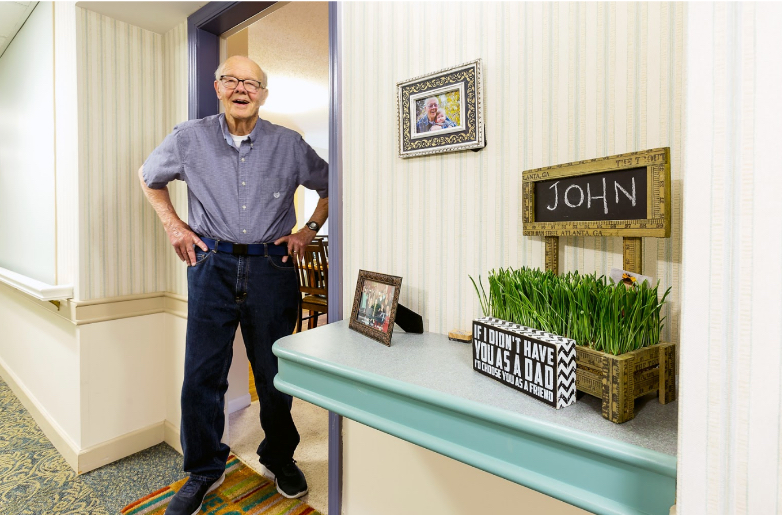Personalized Memory Care for Seniors in a Safe Environment
Wiki Article
Exploring the Importance of Memory Treatment Provider in Small Memory Care Houses
Memory treatment services play an important role in boosting the lives of individuals with cognitive impairments. In tiny memory care homes, the focus changes to individualized care customized to each citizen's special needs. These intimate settings cultivate much deeper links and an encouraging neighborhood. However, the inquiry stays: just how do these atmospheres specifically add to the emotional health of both locals and their families? Understanding this vibrant exposes the true worth of specialized memory treatment.Recognizing Memory Care and Its Relevance
Memory care is a necessary part in attending to the distinct needs of individuals with cognitive problems, such as mental deterioration and Alzheimer's disease. This specific kind of treatment focuses on producing a risk-free and encouraging environment tailored to the obstacles dealt with by these people. Memory care centers employ skilled team that understand the complexities of cognitive decline, using individualized treatment that advertises self-respect and respect.Activities and routines are designed to stimulate memory retention and cognitive feature while making sure safety and security. Furthermore, memory care stresses social interaction, which can relieve sensations of seclusion and boost psychological health. By cultivating an organized atmosphere, people can browse their day-to-days live with more confidence. Recognizing the relevance of memory treatment exposes its duty in improving lifestyle, making it possible for people to keep as much freedom as possible while receiving the assistance they need.
The Benefits of Smaller Memory Treatment Homes
Smaller sized memory treatment homes supply an even more intimate setup that can considerably enhance the quality of take care of residents. With fewer citizens, team member can develop stronger connections, fostering trust and emotional links. This customized focus usually brings about boosted interaction, making it simpler for caregivers to understand and meet the unique needs of each homeowner. On top of that, smaller settings normally minimize interruptions and stressors, promoting a soothing environment for memory retention and emotional health. The design of smaller sized homes usually urges socialization amongst citizens, permitting purposeful interactions that can combat sensations of isolation. These homes can adapt much more promptly to adjustments in treatment demands, ensuring that citizens obtain timely support - small memory carehomes Charlotte. In general, the customized focus, decreased stress, and improved social possibilities located in smaller sized memory care homes create a nurturing environment that sustains both cognitive feature and psychological health and wellnessPersonalized Care Plans for Person Needs
Personalized treatment strategies are vital in resolving the unique needs of people in memory treatment. These strategies typically include customized assistance strategies that improve daily living and advertise health. In addition, individualized activity interaction assists citizens get in touch with their interests, fostering a sense of objective and pleasure.Customized Assistance Strategies
When creating tailored support methods in memory treatment services, comprehending the unique requirements of each individual is fundamental. These strategies involve creating customized care plans that provide to the details needs, preferences, and capabilities of homeowners. By examining cognitive function, psychological health, and physical health and wellness, caretakers can create efficient treatments that promote comfort and freedom - small memory carehomes Charlotte. This individualized approach assurances that each resident obtains proper support, enhancing their lifestyle. Regular examinations and adjustments to these plans are vital, as they allow caregivers to react proactively to changing requirements. In addition, involving member of the family in the planning procedure cultivates a collaborative atmosphere, enhancing the assistance network for individuals with memory challenges. Eventually, tailored assistance techniques are crucial for delivering efficient and compassionate memory treatmentIndividualized Activity Involvement
Producing meaningful interaction with individualized activities is vital in memory care solutions. Memory care homes focus on personalized treatment strategies that deal with the unique needs and choices of each local. These plans frequently include tasks customized to homeowners' passions, capacities, and cognitive levels, improving their sense of purpose and dignity. By integrating acquainted regimens, pastimes, and social interactions, caretakers can boost cognitive feature and psychological health. Individualized task engagement not just cultivates a supportive setting however likewise encourages residents to maintain their self-reliance. The active participation in these tailored tasks can cause improved mood and minimized anxiousness, enhancing the relevance of an alternative strategy in memory treatment that recognizes each individual's journey and distinct experiences.Developing a Helpful Area Setting
While cultivating a supportive area setting is essential for those with memory care needs, it requires deliberate layout and thoughtful engagement. Creating such a setting entails a mix of physical area and social connections. Tiny memory treatment homes can profit substantially from designs that encourage social communication, such as open typical locations and comfy event spaces. These styles promote a feeling of belonging and protection for residents.Moreover, team member play a crucial role in cultivating this environment. Educating caregivers to focus on empathy and active listening enhances relationships and cultivates count on. On top of that, involving families in care strategies and neighborhood tasks can reinforce bonds and develop a network of assistance.Enhancing Social Interaction and Tasks
Efficient social engagement and tasks are essential for improving the well-being of homeowners in memory treatment homes. These interactions not just foster a sense of belonging yet additionally stimulate cognitive functions, which can positively impact memory retention. Small memory treatment homes commonly offer individualized programs tailored to the special interests and abilities of each local, allowing for more reliable and meaningful engagement.Activities such as art treatment, songs sessions, and team games motivate locals to get in touch with one another, advertising relationships and decreasing feelings of isolation. In addition, including exterior tasks, such as horticulture or nature strolls, can improve state of mind and total health.These improving experiences help locals keep a feeling of purpose and pleasure in their lives. By producing an environment that prioritizes social communication, little memory care homes substantially contribute to the mental and psychological well-being of their homeowners, guaranteeing they really feel valued and supported in their trip.Supporting Families Via the Journey
As useful source family members navigate the obstacles of taking care of a loved one with memory disability, the assistance supplied by tiny memory care homes becomes necessary. small memory carehomes Charlotte. These homes supply not only specialized care for locals but likewise important sources for family members. By promoting a collaborative setting, little memory treatment homes encourage open interaction, allowing households to share issues and share experiences.Support teams and academic workshops are commonly available, gearing up households with understanding and methods to take care of the complexities of memory loss. Such initiatives help decrease sensations of seclusion, as households attach with others encountering similar situations.Moreover, little memory care homes frequently provide tailored updates on citizens' well-being, relieving families' worries and aiding them feel associated with their liked one's life. This holistic technique to support not only improves the quality of care for residents yet likewise equips families throughout their psychological journeyThe Effect of Specialized Staff Educating on Care Top Quality
In little memory care homes, the high quality of care is profoundly affected by the training and expertise of the team. Specialized training equips caregivers with crucial abilities to recognize and address the one-of-a-kind requirements of homeowners with memory problems. Expertise of dementia-related habits, efficient interaction techniques, and Website person-centered care methods enhances the capability of staff to develop an encouraging environment.Moreover, experienced team are better prepared to manage tough scenarios, lowering the chance of problems and ensuring a calmer environment. This training cultivates a much deeper emotional connection in between locals and caregivers, promoting trust fund and improving overall wellness. Furthermore, specialized training can result in greater work fulfillment amongst caretakers, minimizing turnover rates and giving continuity of treatment for residents. Inevitably, the investment in team education considerably raises the criterion of care, which is crucial for improving the quality of life for people in small memory treatment homes.
Often Asked Questions
How Do I Select the Right Memory Care Home for My Loved One?
Picking the right memory treatment home includes evaluating personal requirements, seeing facilities, evaluating team experience, comprehending care choices, thinking about area, contrasting costs, and looking for recommendations. Each factor plays a crucial duty in making certain optimal treatment.What Is the Cost Difference In Between Small and Huge Memory Care Facilities?
The price difference in between little and big memory care centers can vary significantly. Usually, small homes may supply even more individualized care at a higher per-person rate, while bigger centers typically provide more services at a lower general expense.How Usually Can Families Check Out Their Loved Ones in Memory Care Residences?
Families can commonly visit their enjoyed ones in memory care homes as frequently as preferred, with numerous facilities urging routine check outs to keep links and support psychological wellness, though particular plans may differ by home.What Particular Activities Are Used in Small Memory Treatment Houses?
Tiny memory care homes generally provide tasks like crafts and arts, music therapy, horticulture, exercise classes, and cognitive video games. These tasks are designed to involve homeowners, stimulate their minds, and promote social interaction among them.Exist Any Kind Of Age Restrictions for Locals in Memory Care Facilities?
Age limitations for homeowners in memory care facilities usually differ by area and individual facility policies. Typically, these homes accommodate older grownups, commonly calling for homeowners to be a minimum of 55 or 60 years of ages. In tiny memory you can try this out care homes, the focus changes to individualized care customized to each homeowner's distinct requirements. Memory treatment facilities utilize experienced staff who recognize the complexities of cognitive decline, using individualized care that advertises dignity and regimens and respect.activities are developed to promote memory retention and cognitive function while making sure security and safety. Smaller memory care homes provide a more intimate setup that can significantly boost the high quality of care for residents. Memory treatment homes focus on customized care strategies that provide to the distinct needs and choices of each citizen. As households navigate the challenges of caring for an enjoyed one with memory disability, the support given by little memory care homes comes to be crucial.Report this wiki page